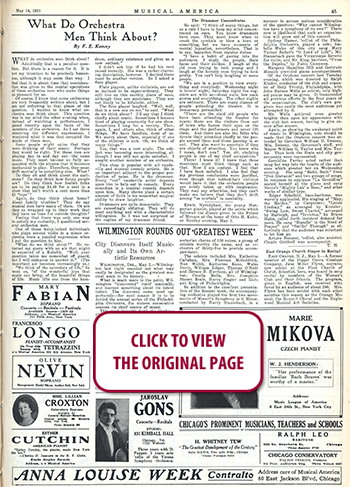 100 YEARS AGO IN MUSICAL AMERICA (405)
100 YEARS AGO IN MUSICAL AMERICA (405)
May 14, 1921
Page 45
What Do Orchestra Men Think About?
By F. E. Kenny
WHAT do orchestra men think about? Admittedly that is a peculiar question. But there is a reason for it. It is not my intention to be precisely humorous, although it may seem that way. I feel that it is about time that consideration was given to the mental operations of these orchestra men who make things so pleasant for us.
Of course, I know that some orchestras are very frequently written about, but I am not referring to that phase of the question. I wanted to know what orchestra men think about. This question was in my mind the other evening when, instead of watching a performance, I gazed intently upon the faces of the members of the orchestra. As I sat there observing the different expressions, I wondered what it was that occupied the minds of these men.
Some people might opine that they were thinking of their music. Perhaps they would be right. Yet these men are playing day in and day out—the same music. They must become so fully acquainted with the strains that it becomes mechanical to play. Therefore, they must drift mentally to something else. What?
Do they sit and think about the audiences? Do they think how funny people are? Do they think how foolish folks are to be paying $4.40 for a seat in a show that isn't worth a cent more than $1 “tops”?
Again, do they think about home? About family troubles? They do say musical men have many of them. Or are they so wrapped up in their work that they have no time for outside thoughts? Feeling that there was only one way to satisfy my curiosity, I questioned several orchestra men. One of those wavy-locked individuals who plays second violin in a minor orchestra wore a puzzled expression when I put the question to him.
“What do we think about?” He returned my query with an air that might be expected of a Kubelik.
“Well, your question takes me somewhat off guard, but I will endeavor to answer it.” (The important air becomes increasingly so.)
“We think of the splendors of life,” he went on, “of the wonderful joys that music can bring, of the beautiful things of life. Music lifts one from the hum-drum, ordinary existence and gives us a new outlook.”
I didn't ask him if he had his rent raised recently. His was a rather charming description, however. I decided there must be another version. So I asked a flute player.
Flute players, unlike violinists, are not so inclined to be super-ordinary. They still live on this earthly plane of ours, although they are musicians. They are not likely to be hifalutin, either.
The flute player laughed. “Well, well, that is a new one on me,” he said. “What do we think about? I'll say that I think chiefly about music. Sometimes I become tired of playing constantly for one show. Sometimes I long for a variety. Then, again, I, and others also, think of other things. We have families, most of us. We worry about them, especially if one of the children is sick. Oh, we think of many things.”
Yes, that was a new angle. The subject was becoming more interesting, although I was still not quite satisfied. I sought another member of an orchestra.
This chap is popular with all vaudeville and musical comedy artists. He is an important adjunct to the proper production of noise. He is·the drummer. Every “nut” vaudeville artist depends upon him to help out in comedy. Every comedian in a musical comedy depends upon him. Many shows place a certain amount of faith in his somewhat magical ability to draw laughter.
Drummers are quite democratic. They are exceedingly obliging. They will do most anything and with a characteristic willingness. So I was not surprised at the replies of my drummer friend.
The Drummer Concentrates
He said: “I think of many things, but as a rule I have to keep my mind concentrated on cues. You know drummers have cues. They must know when to crash the cymbals or blow a horn or something, but we have moments of mental lapsation, nevertheless. That is to say, lapsation from regular duties.
“I have a habit of gazing into the audiences. I study the people, their faces and their clothes. I laugh at the old ones trying to look young and I laugh at the homely ones trying to look pretty. You can't help laughing at some people.
“We are in a position to view everything and everybody. Wednesday night is lovers' night; Saturday night the regulars are with us—dress suits. Low-neck gowns and everything. The other nights are ordinary. There are many classes of people attending the theater. It is democracy personified.
“There are the staid old people who have been attending the theater for years; there are the visitors from out of town who fasten their eyes on the stage and the performers and never lift them. And there are also the folks who devote their attention chiefly to the people around them and those passing in or out. They also want to ascertain if they are objects .of attention. You know who I mean, don't you? Yes, sir, studying people is one of my chief occupations.”
There! I knew it! I knew that these musicians must think things such as that. Now I am content. I feel that I have been satisfied. I also feel that my previous conclusions were justified, even though that bobbed-hair violinist would have it that the orchestra people are solely taken up with inspiration. They may say otherwise, but they can't make me believe that they don't drift among “us mortals” in mentality.




 RENT A PHOTO
RENT A PHOTO





